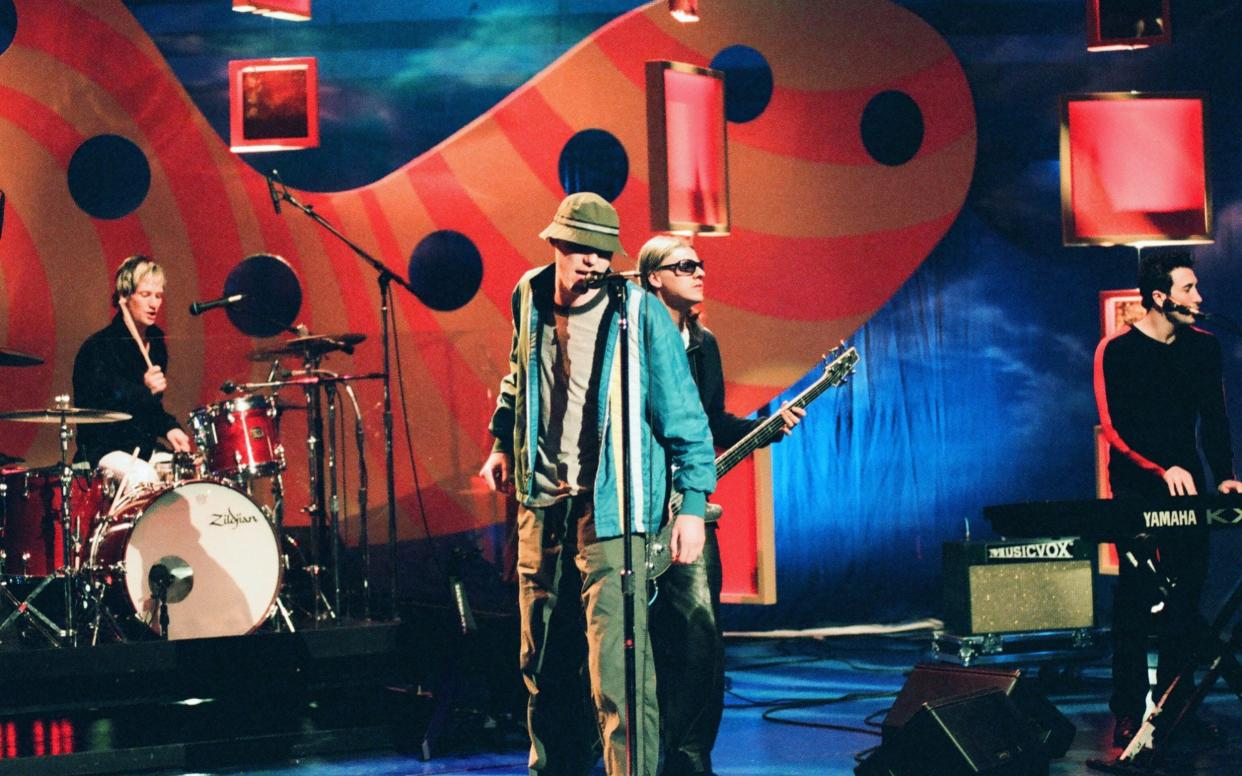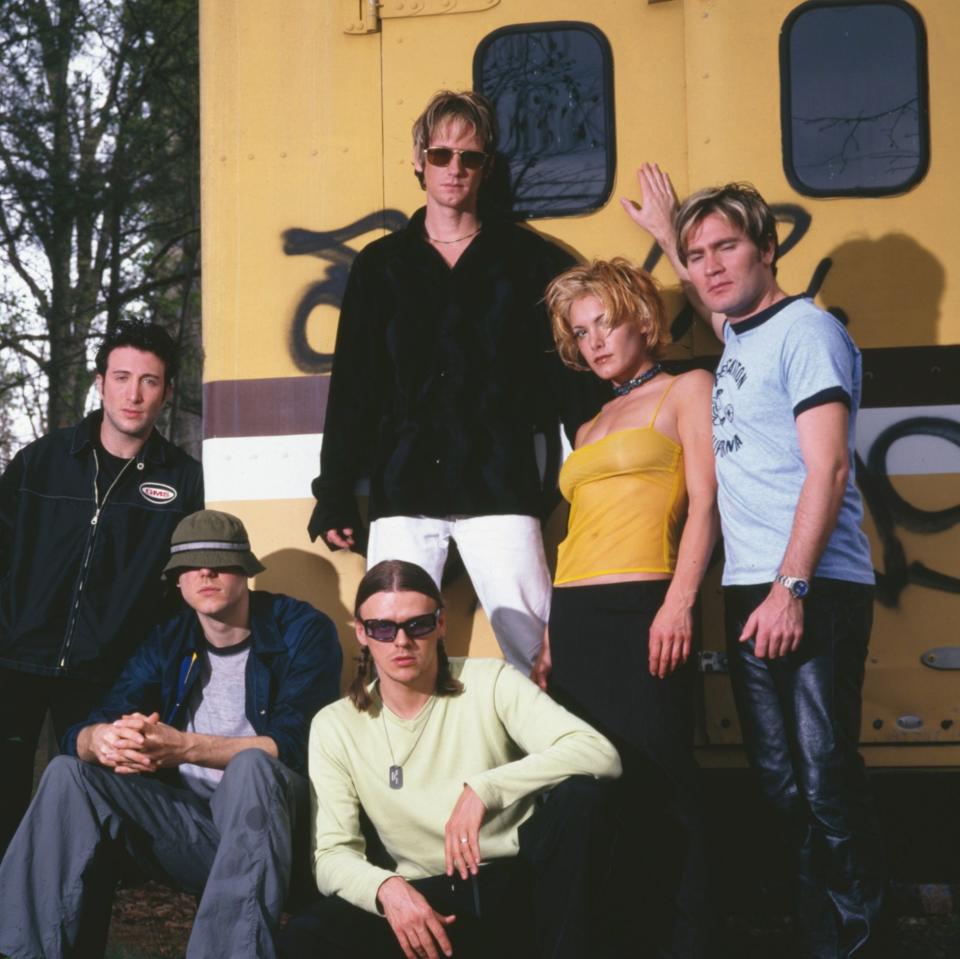From death threats to playing with Biden: why one-hit wonders The New Radicals disappeared

- Oops!Something went wrong.Please try again later.
As stars such as Lady Gaga, Bruce Springsteen and David Grohl come out to serenade newly inaugurated President Joe Biden in Washington DC, a skinny and very bald 50 year-old will stand apart the crowd. He’ll probably be wearing a Nineties-style bucket hat, for one thing.
Gregg Alexander, sole permanent member of one-hit wonders, the New Radicals, has reformed his largely fictional “band” in tribute to Biden, whose late son Beau adored the group. The New Radicals’ 1998 smash, You Get What You Give, has also featured as the campaign trail “walk on” song for Vice President Kamala Harris’s husband, Doug Emhoff.
With the backslapping and self-congratulations sure to be off the scale, you wonder how comfortable the shy Alexander will feel. He became briefly infamous in the Nineties, after all, as a pop star who hated being a pop star.
His disdain for pop’s A-list is explicitly spelled out on You Get What You Give. In its final third, the track takes a break from sounding like a mash-up of the Beach Boys and Smashing Pumpkins to deliciously swipe at Beck, Hanson, Courtney Love and Marilyn Manson. “You're all fakes/ Run to your mansions,” he sings. “Come around, we'll kick your a**es” (Alexander’s dislike of Hanson and Manson may have had something to do with the fact their names rhymed).
These lyrics and his subsequent retreat from the spotlight confirmed Alexander as a late entry into the club of great pop recluses. He was one of those nakedly vulnerable rock stars they apparently stopped making at the end of the 20th century. This was a small but significant clique which also included the late Syd Barrett and Brian Wilson of the Beach Boys. Today, everyone wants to be famous so the genre has largely faded away (Jesy Nelson from Little Mix is about as close as you get).
Barrett and Wilson were casualties of the rock 'n' roll industrial complex. Alexander is different in that he very consciously broke up the New Radicals – by fax and at the height of their success. He was fed up with fame and wanted out of the limelight. Which is why his White House comeback feels like such a bolt from out of nowhere. What next? Weezer playing for the United Nations? BMX Bandits rocking Holyrood?
In Washington, it’s hard to imagine him getting dragged into the inevitable group singalong alongside Gaga and Springsteen. Alexander arguably embodied the anti-sellout Nineties spirit as completely as Kurt Cobain or Pearl Jam when they took on Ticketmaster. So how will he feel about sharing a Washington DC bill with Gaga, Springsteen and Foo Fighter leader Dave Grohl? These, after all, are the very stars he might lampoon were he to write You Get What You Give today.
“Artists are supposed to observe life,” he told the Hollywood Reporter in 2014 in one of his only interviews since retreating from the public eye. “My favourite artists — Prince, [David Lee] Roth-era Van Halen, even Madonna when she was doing cutting-edge work — they were mysteries to me. That was part of what made their work compelling, was that we didn't have their opinions tweeted and Facebooked every 30 seconds.”
You Get What You Give was received in 1998 as a pleasing ditty that went a bit potty at the end and start taking wild swings at other stars. Actually it was a lot more radical: a punk anthem with a bubblegum veneer. The lyrics are a screed against corporatism and groupthink ; the accompanying video shows a crowd taking over a mall and locking people in suits in cages. “Health insurance, rip off lying FDA, big bankers buying,” sings Alexander before he gets around to dissing Beck and Hanson.
“As an experiment on the song You Get What You Give, I had what at the time was one of the more political lyrics in a long, long, long time, to the point where some of the people I was working with were horrified,” Alexander would say. “In a pop song, I was going after health insurance companies and corruption. To allude to all that stuff in a pop song was, in retrospect, a naively crazy proposition.”

As he acknowledged, political lyrics were a huge gamble But by the late Nineties Alexander had already been around the block several times. He may have felt he had little to lose.
He had arrived in Los Angeles in 1986, a starry-eyed 16 year old from Detroit obsessed with Prince’s Purple Rain. Fate initially appeared to smile on him as he met mogul Jimmy Iovine, who offered him a deal with A&M records.
Unfortunately his first album, as Gregg Alexander, came out just after Polygram bought out A&M. Suddenly, nobody cared about this wide-eyed kid from Michigan who wanted to be the next Prince.
He then signed to Epic. But his second solo record – another maximalist pop odyssey – coincided with the heyday of Nirvana and Pearl Jam. The label, being a record label, pressured him to don a plaid shirt and put a little gravel in his voice. Alexander demurred. Paradoxically he did so for reasons of which Kurt Cobain might have approved. “I couldn't fake that,” said Alexander. “I had to follow my heart creatively.”
Two strikes – he should have been out. So he decided to stop following the rules and instead write completely from the heart and without constraint. These new demos were recorded in downtime in studios across LA, with whatever session players he could persuade to pitch in. And so was born the New Radicals album.
“Most of that record was me pulling favours with studios or musicians that had played on earlier records and were like, ‘Oh, Gregg's down on his luck — let's go play on his demo for the hell of it, we'll have a good laugh, have a couple of beers and maybe smoke a jay or whatever'.” One of those pitching in was songwriter Rick Nowels, who would co-author You Get What You Give (and later help write Lana Del Rey’s best song, Summertime Sadness).
And then, miracle of miracles, he was signed again – for a third time. Michael Rosenblatt, who discovered Madonna, was sent a tape of New Radicals demos. Those recordings became the basis for Maybe You’ve Been Brainwashed Too – the New Radicals’s first and only album. The LP came out in October 1998 and was presented as a band project. In truth it was Alexander flanked by session players. These included former child actress Danielle Brisebois, quasi-famous in America for sitcoms such as All In The Family (she and Alexander were listed as the only two permanent members).

Maybe You’ve Been Brainwashed Too was well received, though some critics cringed at the anti-corporate lyrics and the many drugs and sex references. However, the real success story would begin the following month with You Get What You Give. It was an instant hit. Alexander recalled walking through downtown LA and being stunned by the tune’s ubiquity.
"I was on Sunset Boulevard walking down the street shortly after the record came out, and I heard the song blasting out of someone's car — and my immediate instinct was, ‘Oh, my God, someone stole my demo tape!’ I was really serious, too,” he told the Hollywood Reporter. “And then I heard it coming from another car like a minute later and I was like, ‘Oh, my God, how did all these people get my demo tape?!’”
You Get What You Give peaked at 36 in the US and went to number five in the UK. Non other than Joni Mitchell declared it "the only song I have liked in a long time". Yet not everyone saw the funny side of the digs at Courtney Love, Marilyn Manson etc. Among those failing to get the joke was Marilyn Manson, who threatened to kick Alexander’s a** right back.
“I’m giving an open invitation to the singer of the New Radicals,” Manson said. “He’s all strange and spiritual and he challenged me in one of his songs. A lot of people would say ‘y’know – don’t give him the attention, cause that’s what he wants’. But I think I’ll crack his skull open if I see him.”
Alexander’s response was to claim that Manson had misapprehended the lyrics. His vitriol was aimed at big corporations – rip-off insurance companies etc. – not big pop stars.
“There’s this whole hysteria and curiosity over peripheral stupidity instead of focusing on real issues,” Alexander told MTV. “And a lot of people I talked to asked me about those real things, while a lot of rock media tried to turn it into a cat fight. I heard about Manson's reaction, but I think it's based on a misunderstanding of the lyrics.”
He put together a touring band and played the game for a while – appearing on the Jay Leno show and supporting the Goo Goo Dolls on an arena tour. In April 1999, the New Radicals even confirmed their transatlantic stardom with a spot on Top of the Pops.
Yet the success he had chased for years proved unsatisfying. In July 1999, two weeks before the release of the video to the New Radicals’ next single, Somebody We’ll Know, he issued a press release stating the group “will no longer be a recording, promoting, or performing entity”.
“It was an experience playing the artist, but I accomplished all of my goals with this record, and I’m ready to move on and make the next step in my career,” said Alexander.
And that was that. He went to London, where Universal Records CEO Lucian Grainge took him on as a special project. Sometimes writing under an assumed name, he helped compose such hits as Ronan Keating’s Life is a Rollercoaster, Sophie Ellis-Bextor’s Murder on the Dance Floor and Texas’s Inner Smile. In 2003 he and Rick Nowels won a Grammy for Santana’s The Game Of Love, with vocals by Michelle Branch, while in 2013 was nominated for an Oscar for creating the music for Keira Knightley/Mark Ruffalo musical romcom Begin Again.
And now, suddenly, and slightly randomly, he and the New Radicals are back, playing a Presidential inauguration. It’s been a strange journey for Alexander. As a pop star who refused to follow the rules, he would surely have it no other way.

